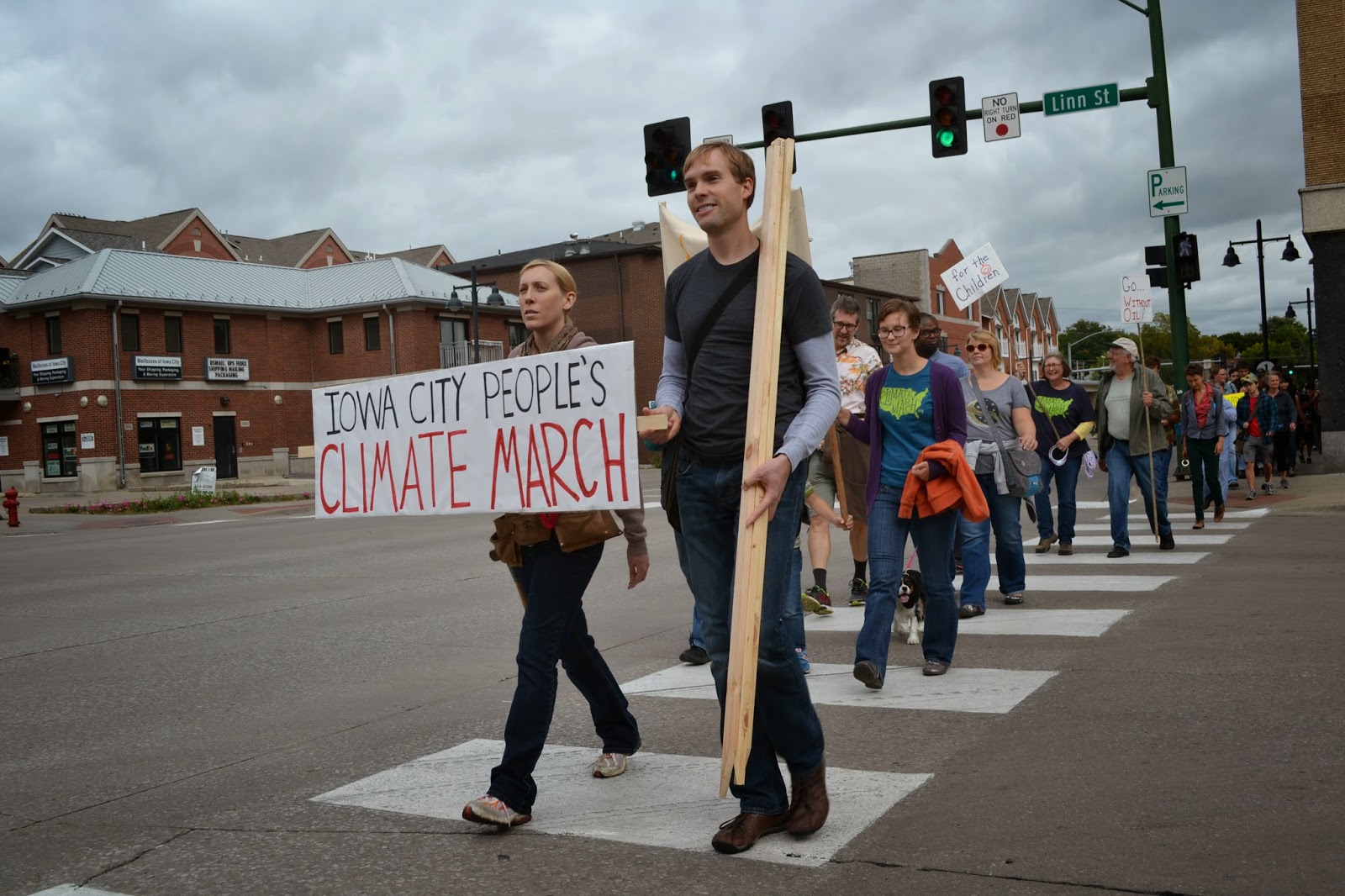The People's Climate March demanded action at government offices and Campaign Nonviolence held a rally to unite the peace and justice community.
By Jon Overton
IOWA CITY, Ia. — While the People’s Climate March rocked New York City and the United Nations commemorated the International Day of Peace last Sunday, advocates for peace and climate action held a march and a rally in downtown Iowa City last Sunday.
Protesters marched to the offices of Rep. Dave Loebsack, D-Iowa, the Johnson County Administration Building, University of Iowa President, Sally Mason’s offices, and to City Hall, making a series of demands to take action against climate change at each location.
 |
Protesters march up Burlington St. in downtown Iowa City. Over 125
people participated in the demonstration. See our slideshow here.
(Jon Overton/Iowa Peace Network)
|
Among the demonstrators’ formal proposals were imposing taxes on carbon dioxide emissions, incentivizing individuals to cut their energy use, expanding recycling services, and investing in public transportation.
Immediately after the climate march, peace activists held a rally on the Pedestrian Mall as part of a national initiative, Campaign Nonviolence. The Campaign’s organizers hope use it to establish a “culture of peace.”
“We usually think of violence as happening between people and between nations; we don’t think of it as a way that includes how we relate to our natural world,” said Barbara Schlachter, an Episcopal priest and environmental activist. “However, violence is a good word to use as we human beings are doing disastrous things to the environment upon which we all depend.”
Brittany Kimzey, an intern for the University of Iowa Center for Human Rights said she hoped the climate march would bring more attention to the danger climate change poses.
“I hope to raise a lot of awareness and I hope that a lot of the politicians that we’re trying to lobby today will take notice that people in Iowa City care, and people in New York will know that we’re backing them up on all this,” she said.
The People’s Climate March in New York City was the largest climate protest in history, with over 400,000 people in attendance. It was held to put pressure on world leaders at a United Nations summit on climate change.
Ed Flaherty, a member of PEACE Iowa and Veterans for Peace, said that because disasters fueled in part by climate change frequently put such massive strain on the victims, it often leads to further violence.
“Climate change is bringing about environmental degradation, and people have limited resources, they become refugees, they have to move, they have no way to feed their families, that degenerates, that’s a violence in and of itself, and it leads to physical violence between groups,” he said.
 |
| Ed Flaherty explains the connections between violence, social inequality, and environmental destruction at the Campaign Nonviolence rally.
See our slideshow here. (Jon Overton/Iowa Peace Network)
|
Some protesters pointed to environmental catastrophes in our own backyard as a major point of concern.
In the past few summers, Iowa has experienced heavy rainfall and flooding, which is then often followed by a drought, devastating agricultural production, said Jenny Arnold, a resident of North Liberty who attended the climate march.
The 2014 National Climate Assessment stated that as temperatures continue to rise, corn yields in the Midwest will likely decline. The 2008 floods were also responsible for damages of around $15 billion across the region due to poor harvests and disrupted major transportation routes. A number of Iowa cities suffered millions of dollars in damages, worst among them was Cedar Rapids, which suffered costs of $5 to $6 billion.
These kinds of disasters are only expected to increase in frequency as the climate crisis worsens.
Contributing to these environmental woes, Flaherty pointed out, the U.S. Department of Defense is the nation’s biggest consumer of oil. Indeed an energy report from the Department shows that the institution uses around $16.4 billion of fuel in 2012, more than any other organization in the United States.
The Campaign Nonviolence rally also featured a number of speakers and musicians from a diverse range of faith backgrounds, in addition to representatives from a wide spectrum of activist groups.
Mary Kay Kusner, the coordinator of Iowa City’s Campaign Nonviolence rally said the gathering was intended to pull together a large swath of organizations and people who were dedicated in one form or another to decreasing violence in the world.
“I hope they’ll be energized to make a commitment to become more nonviolent in their own life,” she said, “and maybe join an organization that helps them to network with others who are doing the same.”
Mary Kay Kusner, the coordinator of Iowa City’s Campaign Nonviolence rally said the gathering was intended to pull together a large swath of organizations and people who were dedicated in one form or another to decreasing violence in the world.
“I hope they’ll be energized to make a commitment to become more nonviolent in their own life,” she said, “and maybe join an organization that helps them to network with others who are doing the same.”
Jon Overton is the Media Editor of Iowa Peace Network and an undergraduate at the University of Iowa studying Ethics & Public Policy and Sociology.
No comments:
Post a Comment